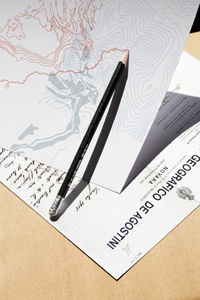
Second section. Human signs
is the purpose of geography to make war?
Representation of human beings
an exhibition of maps and art
Set up like a “geographer’s study” the exhibition enters the heart of cartography. Each symbol, each conventional sign on a geographic map is the result of cultural mediation, of a point of view that the geographer provides as the interpreter and mouthpiece of that historical period. Here, the dominant sign that the exhibition intends to analyse is the one used to mark the borders of the human communities in the territory.
The decades prior to the Great War stimulated the creation of ethnic-linguistic maps which were highly effective in visually representing oppressed nationalities for the first time (Italian, Slovenian, Czech, Bohemian, Croatian, Serbian, Magyar and Romanian) drawing each one inside its own “historical”, “cultural” and “natural” borders. Yet again, geographic maps gave major abstract concepts a concrete form, such as the concept of ethnic group and nation, while lending itself to easy manipulation. Anthropologists have long since explained that these are inventions: «an ethnic group is a group of people that believe they belong to the same ethnic group», and nationalisms are what make nations with historical narrations prepared for the purpose of giving depth and continuity, in time and space, to the idea of nation.
In Italy these concepts were strongly expressed by geographical publishing houses such as De Agostini, Touring Club, and by associations such as Reale Società Geografica who shared their support of the government and the national colonial commitment and then war against Austria.
The exhibition includes an important example of these shared values with l’Atlante della nostra guerra (Atlas of our war) published in 1916.
This “study” also includes the works of one of the major geographers of the time, Cesare Battisti, the first to produce a complete work of Trentino, aware of the social and civil function of geographical knowledge to learn about, understand, appreciate the value of and spread the social, economic and political values of the places.
